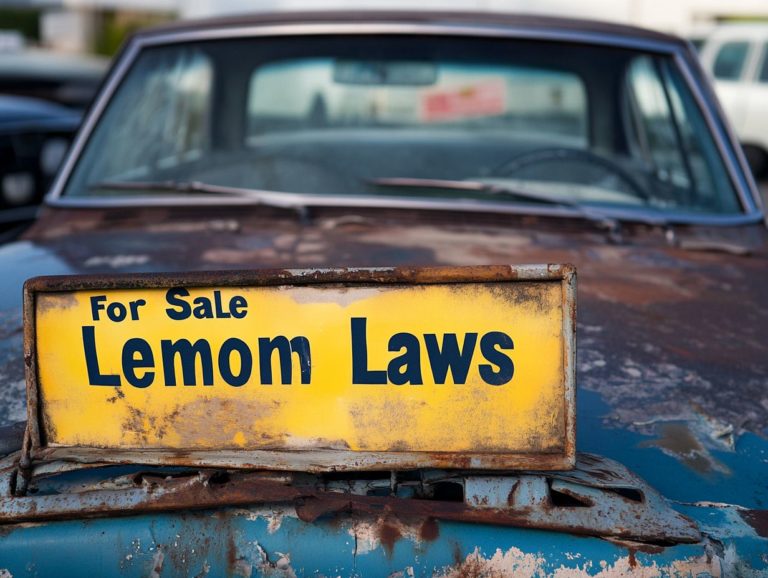The Role of Warranty in Used Car Purchases
Purchasing a used car can feel overwhelming, especially with uncertainties about reliability. This is where a used car warranty shines, providing you with peace of mind and essential financial protection.
In this article, you ll learn about what a used car warranty includes, the many benefits it offers, and the various types available, including manufacturer and third-party options. You ll also receive guidance on selecting the right warranty for your needs and dispelling common misconceptions.
Get empowered and make your used car purchase a success!
Contents
- Key Takeaways:
- Understanding Used Car Warranties
- Benefits of Buying a Used Car with Warranty
- Types of Used Car Warranties
- How to Choose the Right Warranty for Your Used Car
- Making a Claim on a Used Car Warranty
- Common Misconceptions about Used Car Warranties
- Frequently Asked Questions
- 1. What is the role of a warranty in used car purchases?
- 2. Is a warranty necessary when buying a used car?
- 3. What types of warranties are available for used cars?
- 4. What should I look for in a warranty when buying a used car?
- 5. Can I negotiate the terms of a warranty when buying a used car?
- 6. What happens if something goes wrong with the car after the warranty expires?
Key Takeaways:

A used car warranty offers peace of mind and protects your finances. There are different types of used car warranties, including manufacturer and third-party options. Before choosing a warranty, consider coverage, cost, and duration.
Understanding Used Car Warranties
Understanding used car warranties is essential for you as a car buyer. They offer a safety net against unexpected repair costs when acquiring a pre-owned vehicle.
Used car warranties come in many forms. They range from manufacturer warranties to extended warranties and service contracts that help protect your investment.
By carefully reviewing warranty documents and understanding the details, you empower yourself to make informed decisions that optimize your investment.
Understanding your warranty helps you follow state rules and get the right coverage for your needs.
What is a Used Car Warranty?
A used car warranty is a contractual agreement that ensures you re covered for repairs and services on your vehicle after its initial sale. It offers financial protection against potential defects and breakdowns, giving you peace of mind as you drive.
Unlike a manufacturer warranty, which typically covers your vehicle during its first few years, an extended warranty provides extra coverage beyond standard terms. A used car warranty is tailored specifically for pre-owned vehicles. This type usually covers essential repairs like engine and transmission issues, but it doesn t cover routine maintenance such as oil changes or wear-and-tear items.
Coverage can vary significantly among different providers. Some may offer comprehensive plans that include perks like roadside assistance, while others focus solely on major mechanical failures. It s crucial to sift through the fine print before making a commitment, ensuring you choose the warranty that fits your needs.
Benefits of Buying a Used Car with Warranty
Purchasing a used car with a warranty presents you with many advantages, including invaluable peace of mind and financial protection against unforeseen repair expenses.
This not only safeguards your investment but also significantly improves your overall vehicle ownership experience.
Peace of Mind and Financial Protection
One of the primary benefits of a used car warranty is the peace of mind it brings. It shields you from unexpected financial burdens related to repair costs, ultimately enhancing your vehicle’s dependability.
This assurance doesn t just ease your stress; it allows you to enjoy your driving experience without worrying about potential breakdowns or expensive repairs.
Knowing that major mechanical systems are covered lets you focus on the joys of driving whether it s a spontaneous weekend getaway or your daily commute.
With a warranty in place, you can confidently navigate the roads, secure in the knowledge that you’re protected from surprising expenses due to unforeseen mechanical issues. This transforms your ownership experience into something much more satisfying.
Types of Used Car Warranties

Knowing your options for used car warranties can save you money and hassle down the road! These warranties can profoundly influence your coverage, repair costs, and the overall dependability of your vehicle.
Manufacturer Warranties vs. Third-Party Warranties
When exploring a used car warranty, it’s crucial to understand the differences between manufacturer warranties and third-party warranties. Each option offers unique coverage and repair obligations.
Manufacturer warranties provide comprehensive coverage directly from the vehicle’s maker. They typically address key areas like engine components, transmission issues, and vital electrical systems.
In contrast, third-party warranties offer various plans that aim to fill gaps where manufacturer coverage may fall short. However, they sometimes limit the types of repairs included.
As a buyer, weigh these options carefully. Manufacturer warranties offer the peace of mind of factory-backed service, while the flexibility of third-party options may appeal to budget-conscious consumers seeking specific coverage without hefty dealership price tags.
How to Choose the Right Warranty for Your Used Car
Selecting the ideal warranty for your used car is a vital decision. It requires careful assessment of several warranty options.
Consider factors such as:
- Warranty Duration: A longer coverage period can provide significant peace of mind, especially for older models.
- Extent of Repair Coverage: Some warranties may restrict coverage to powertrain issues, while others offer more extensive protection.
- Deductible Amounts: This is the amount you pay out-of-pocket before the warranty kicks in. Understanding this is essential for cost-effectiveness.
The vehicle’s history, including previous repairs and maintenance records, can also shape your warranty choices. This helps you find options that fit your individual needs and the specific risks associated with that car model.
Making a Claim on a Used Car Warranty
To make a claim on a used car warranty, grasp the process and requirements needed to access the benefits effectively.
This knowledge allows you to navigate repair responsibilities and verification procedures confidently, ensuring a seamless experience.
Process and Requirements

Making a claim on a used car warranty typically requires submitting specific documents and meeting certain requirements. This ensures that all repairs fall within the warranty terms.
Gather necessary repair documentation, including detailed invoices and receipts from licensed service centers. Completing the required claims forms accurately is vital, as discrepancies may lead to frustrating delays or outright denials.
By understanding the claims process, you can anticipate potential challenges, ensuring you receive the benefits you rightfully deserve. Being proactive and well-informed can significantly reduce frustration and maximize your warranty coverage, ultimately saving you time and money during unexpected repairs.
Common Misconceptions about Used Car Warranties
Beware of common misconceptions that could mislead you about your warranty! These misunderstandings can relate to warranty risks, coverage limits, and your responsibilities as a buyer during the warranty period.
Debunking Myths and Misunderstandings
Understanding myths about used car warranties is crucial for buyers. It helps you avoid pitfalls and know your warranty options.
You might think all used car warranties cover every issue. However, many exclude parts like normal wear-and-tear or specific electronics.
Some argue that buying a warranty is a waste of money. In reality, it can offer peace of mind and save you from pricey repairs.
By understanding the details of warranties, you can make informed choices that match your needs and budget. Don t miss out on the peace of mind a warranty can bring!
Watch this video to learn more about the importance of used car warranties!
Frequently Asked Questions
1. What is the role of a warranty in used car purchases?
The role of a warranty is to guarantee that the car you are purchasing is in good working condition and free from major defects, making it important to understand what to consider when buying a used car warranty.
2. Is a warranty necessary when buying a used car?

While it’s not legally required, having a warranty can provide peace of mind and protect you from costly repairs if something goes wrong.
3. What types of warranties are available for used cars?
There are two main types of warranties: dealer warranties and manufacturer warranties. Dealer warranties vary in coverage and duration, while manufacturer warranties typically cover a wider range of issues for a longer time.
4. What should I look for in a warranty when buying a used car?
Make sure to check the coverage and duration. Also, look for deductibles or exclusions that might limit your warranty’s coverage.
5. Can I negotiate the terms of a warranty when buying a used car?
Yes, you can negotiate the warranty terms. Read through it carefully and discuss any questions or requests with the seller before finalizing your purchase.
6. What happens if something goes wrong with the car after the warranty expires?
If an issue arises after the warranty expires, you will be responsible for the repair costs. That’s why it’s essential to inspect and test drive a used car before purchasing, even if it comes with a warranty.






